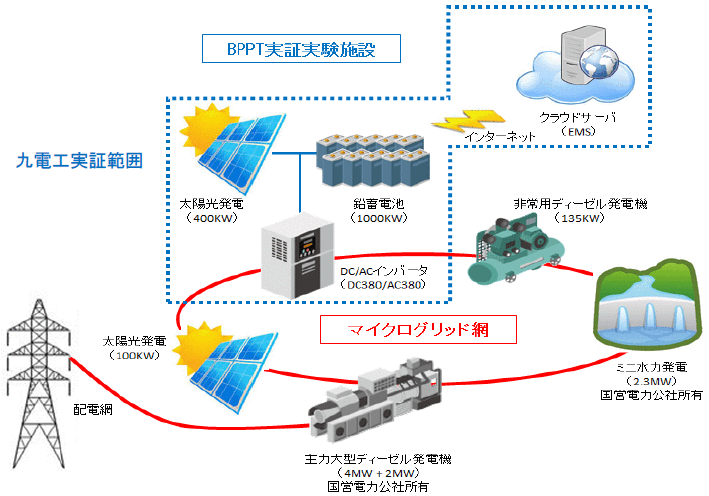Introduction of a Hybrid Power Generation Control System That is Resistant to Environmental Changes
Kyudenko Corporation
In regions such as remote islands, the local power grid is mainly composed of diesel generators because the power cannot be transmitted over the power grid, and the supply and demand of electricity is always tight because of the lack of stable power supply. The topography of many remote islands also makes them highly vulnerable to natural disasters, so it is necessary to build an electric power system that can withstand various weather conditions.
Kyudenko's hybrid power generation control system is an on-grid system that autonomously stabilizes the unstable solar power generation and supplies it to the grid. Through optimal power control of renewable energies by the energy management system (EMS), it is also possible to respond to sudden changes in weather and other environmental conditions.
| Publication date | February 16, 2018 (Posted on June 21, 2022) |
|---|---|
| Sector | Natural Disasters / Coastal Areas, Life of Citizenry and Urban Life |
Company Overview

Kyudenko Corporation was established in 1944. We have been actively diversifying our business, initially branching out into the air-conditioning and plumbing business ahead of other companies in the industry in 1964, and has since expanded into the environmental/information and network/renewal businesses. With eco-business as the fourth pillar of our business following distribution/electricity/air conditioning, we are also promoting the conventional wind and photovoltaic power generation businesses, as well as developing businesses that bring our own energy-saving technologies together.
In July 2015, we constructed a power generation system using solar and wind power with HTB TECHNICAL CENTER CO., LTD. in the Huis Ten Bosch residential area in Sasebo City, Nagasaki Prefecture, and developed an EMS to control efficient energy supply and demand. Since February 2016, the power lines of Kyushu Electric Power Company, Incorporated has been disconnected from the residential area, and a part of the electricity generated within the area has been covered by the stable supply of renewable energy through this system.
Adaptation Initiatives
[Products and Technologies]
An EMS that remotely controls renewable energy power generation and storage technology will be installed to autonomously provide a stable supply of electricity at a certain time and in a certain amount. It also accumulates power generation and weather data, and the “O&M (Operation and Maintenance) method” will be established. Lead-acid batteries are used for the power storage system. Lead-acid batteries are less expensive but only last less than half of lithium-ion batteries. However, we have developed a lead-acid battery control system that can extend the life more than twice by controlling the charging and discharging of the batteries.
[Project Details]
In the western part of Sumba Island, Agency for the Assessment and Application of Technology (BPPT) of Indonesia was conducting a demonstration test of a hybrid facility composed of a photovoltaic power generation facility, redox flow storage batteries and an emergency diesel generator. However, the power generation and storage were not functioning properly, and the stable power supply to the microgrid was insufficient. In October 2015, the members of BPPT visited the renewable energy-based micro-grid constructed by HTB TECHNICAL CENTER CO., LTD. and Kyudenko Corporation, and requested us to introduce the technology to Indonesia.
In July 2016, the project was selected as the “Financing programme to demonstrate advanced zero-/low-carbon technology innovation for further deployment in developing countries” by the Ministry of the Environment.
In the long run, we plan to establish a local base and develop an EPC business that engages in engineering, procurement, and construction in response to orders from electric power companies.
[Factors for Success and Challenges for Further Development]
The installation of the system was completed after a long period of close collaboration with the local government agencies, development of a system that meets the local environment and specifications, and cost reduction.
In order to continue to install the on-grid hybrid power generation control system to 600 diesel grids including remote islands, we will obtain SNI (Indonesian National Standard) certification through BPPT and approach the Ministry of Energy and Mineral Resources, which is in charge of the installation project. In addition, with a vision of developing renewable energy-based, off-grid power generation control system in other islands of Indonesia, we will also aim to introduce systems that corresponds to independent power sources for non-electrified areas and other specific applications.


